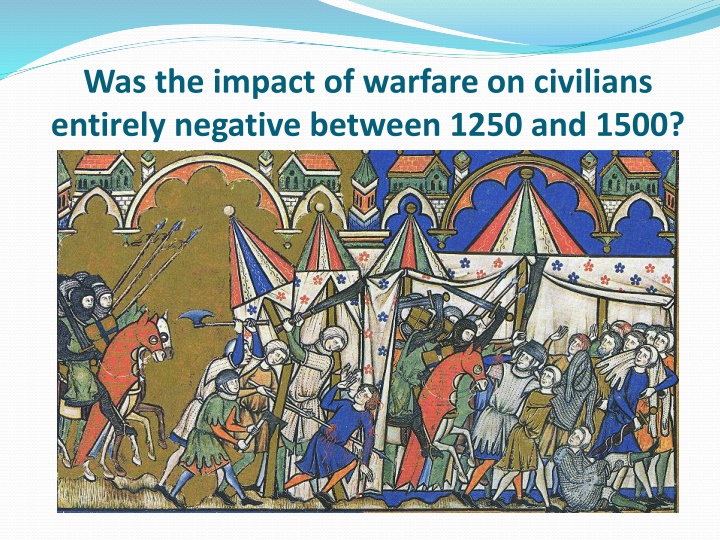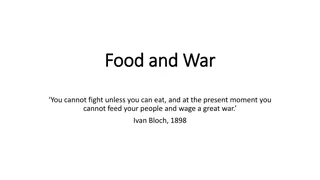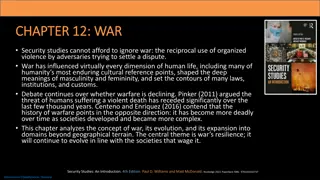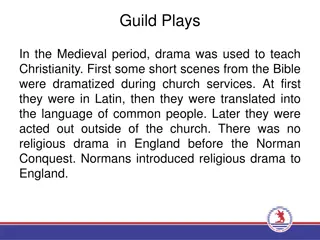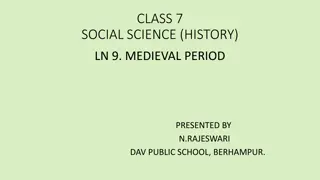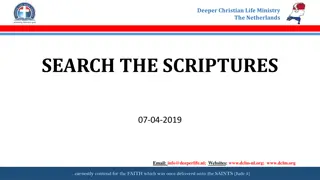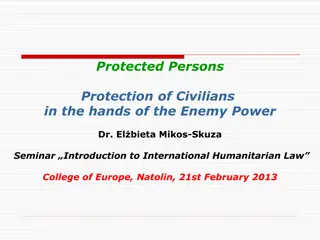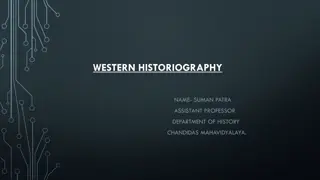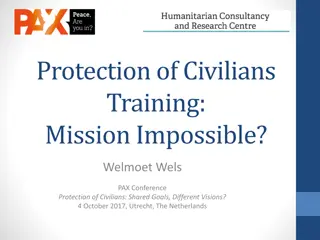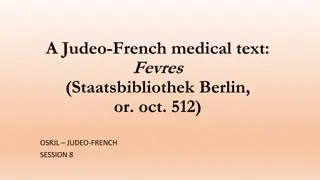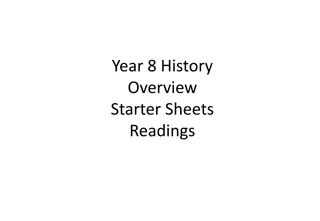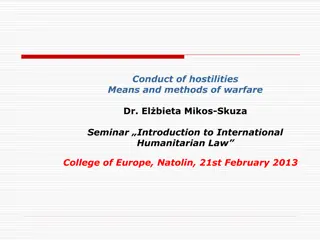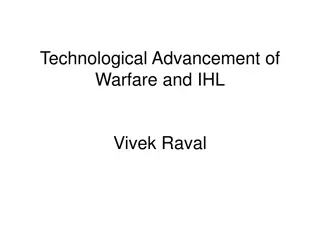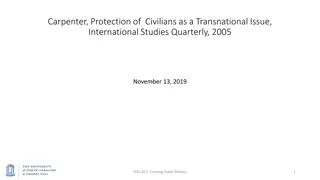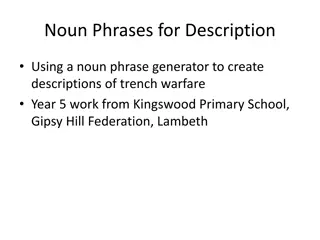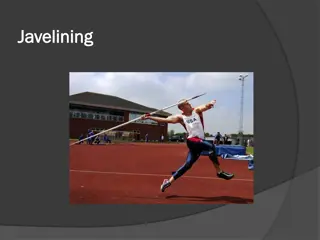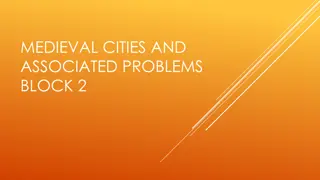Impact of Warfare on Civilians in Medieval Times
Warfare during the Medieval period had varied impacts on civilians between 1250 and 1500, ranging from burdensome taxation and provision demands to the participation of civilians as soldiers. Kings raised funds through taxation and civilians faced the consequences, including the risk of revolt due to high taxes. Explore the changes and continuities in the civilian experience during this turbulent period.
Download Presentation

Please find below an Image/Link to download the presentation.
The content on the website is provided AS IS for your information and personal use only. It may not be sold, licensed, or shared on other websites without obtaining consent from the author.If you encounter any issues during the download, it is possible that the publisher has removed the file from their server.
You are allowed to download the files provided on this website for personal or commercial use, subject to the condition that they are used lawfully. All files are the property of their respective owners.
The content on the website is provided AS IS for your information and personal use only. It may not be sold, licensed, or shared on other websites without obtaining consent from the author.
E N D
Presentation Transcript
Was the impact of warfare on civilians entirely negative between 1250 and 1500?
Learning objective to be able to identify changes and continuities in the impact of medieval warfare in civilians. I can explain the key changes continuities in impact of medieval warfare in civilians. Grade 6 I can explain and assess changes continuities in impact of medieval warfare civilians. Grade 9 I can describe the key changes and continuities in impact of medieval warfare in civilians. Grade 3 and and in
Why did warfare cause problems for the civilian population? Warfare could place great pressure on the civilian population. Warfare demanded provisions, such as food and supplies, and civilians were expected to help provide these. Particularly as the Medieval period saw more war. Also, war was very expensive and placed a heavy burden on the taxpayer.
Why did civilians as soldiers increase? Evidence suggests that there was civilians serving as soldiers in the Medieval period. There are a number of reasons for this Feudal duty civilians were expected to serve as part of their feudal duty to their landlord. Wages with the increase of paid military service, this attracted many who were unskilled and had poorly paid jobs. However, with the option of scutage as well as high desertion rates, there was no more than 10% of the adult population serving in an army at any one time.
What methods could kings use to raise funds for taxation? The most expensive action a king could make was to declare war. Warfare cost huge sums of money and it meant that taxation had to be raised in order to enough funds. Other than gaining loans from wealthy landowners, kings could raise money through two methods of taxation Indirect taxation the amount of money was added as a tax to the cost of goods that were imported or exported. Direct taxation the amount of money in tax that was in proportion to the value of their property. This could only be collected with the approval of Parliament.
What was the impact of taxation on civilians? Taxation became increasingly regular during the Middle Ages and the money was used to pay for wars. Taxation doubled between 1337 and 1422. The problem of high taxation was the risk of civilian revolt. For example, the Poll Tax of 1381 sparked the Peasants Revolt.
How were soldiers fed and sheltered? Purveyance This was the requisitioning of food and supplies from the population. The crown did not pay fair rates [if at all] and this was hugely unpopular with the civilian population. More often, IOUs were given out on the promise to pay later. This caused great hardship and food shortages. Seizing ships The Crown had few, if any, of its own ships. If ships were needed to transport goods and supplies, the Crown could seize as many ships as it liked. Live off the land Soldiers were expected to get food and shelter from the local population. Civilians were expected to provide this when needed. This was a very unpopular burden.
How did direct warfare impact upon the civilian population? Raids Enemy soldiers could raid towns and villages causing significant destruction. This was most common with England s borders with Wales and Scotland. Many of the raids aimed to terrify the population as well as damage enemy resources. Plunder Stealing enemy supplies weakened civilians morale and food stores. Ransoms Sometimes, enemy troops would camp outside a town and demand money so they would not attack. Occasionally, important civilians would be taken hostage to encourage the civilian population to pay up. Sieges Besieging castles and towns was an important strategy for attackers. This caused great hardship for civilians as supplies were cut off until the siege ended. The longer a town held, the more likely, the town would be looted.
How much did the civilian population know about wars? In 1250, the civilian population knew little about current wars. Most were illiterate and the news they received was from the sheriffs who make proclamations in public places. By 1500, literacy rates were growing and there was a growing awareness of current events, especially in urban areas, such as London.
How did civilians benefit from warfare? Better pay Serving in an army could lead to better wages. Not only this, with good fortune, civilians could benefit from a share of plunder and booty. Trade Civilians could benefit if they were involved in industry which provided munitions for war, such as making weapons and armour. Also, these industries would create more jobs.
Complete the table below. Change Continuity Civilians as soldiers Taxation Civilian knowledge of current events Civilians supplying forces
Follow up Tasks Define the following terms. Purveyance Live off the land Direct taxation Indirect taxation What problems could high taxation cause for governments? How far did civilians benefit from warfare?
Plenary My Brain Subheading My Brain Draw an outline of your brain. Fill your drawn brain with all the things you have learnt in this lesson. This can be in the form of key words, drawings, bullet points, lists anything you like so long as it summarises your learning and that others can understand it. http://www.download1.ch/wp-content/uploads/2013/03/Brain-Clip-Art-Vector-Download1.ch_-300x208.jpg http://www.illustrationsof.com/royalty-free-brain-clipart-illustration-1077577.jpg
